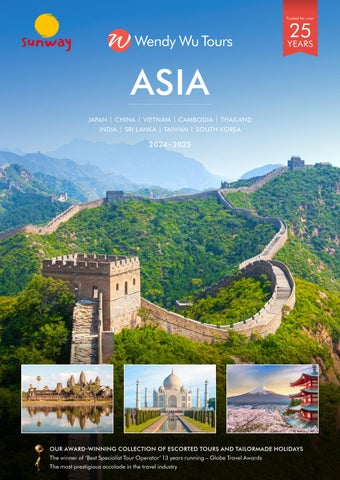When it comes to planning a trip, understanding the roles of tour operators and travel agencies can make a significant difference in your travel experience. While both facilitate travel arrangements, the key differences between a tour operator and a travel agency lie in the services they offer and how they operate within the travel industry.
A tour operator typically designs and organizes travel packages, often including accommodations, activities, and transportation, providing a comprehensive experience for travelers. On the other hand, a travel agency acts as a middleman, assisting clients in booking individual components of their trip, such as flights, hotels, and car rentals.
By decoding the distinctions between tour operators and travel agencies, you can make informed choices that align with your travel preferences and needs. Join us as we unveil the key differences to empower your travel planning decisions.

Understanding the Role of a Tour Operator
A tour operator plays a crucial role in organizing and coordinating travel experiences for clients. Unlike travel agencies that mainly focus on selling pre-designed travel packages, tour operators are involved in creating, organizing, and executing these packages from start to finish.
Detailed Planning and Organization
Tour operators are responsible for meticulous planning and organization of all aspects of a tour. This includes arranging accommodations, transportation, activities, and meals, ensuring a seamless travel experience.
They work closely with hotels, airlines, and other service providers to negotiate the best rates and ensure a high level of service for their clients.
Customized Itineraries
Tour operators often create customized itineraries based on the unique preferences and needs of their clients. This personalized approach allows travelers to have a tailored experience that suits their interests and budget.
- They may include off-the-beaten-path attractions or unique experiences to enhance the overall trip.
- Additionally, tour operators provide expert guidance and local insights to enrich the travel experience.

Definition and Functions of a Travel Agency
A travel agency is a business that serves as an intermediary between travelers and travel suppliers. It assists individuals or groups in planning and booking travel arrangements, such as flights, accommodations, tours, and transportation.
Travel agencies provide personalized assistance to clients to ensure a seamless travel experience, offering destination recommendations, itinerary planning, and travel insurance options.
Key Functions of a Travel Agency
1. Booking Services: Travel agencies secure reservations for flights, hotels, rental cars, and activities on behalf of their clients to meet their travel needs.
2. Customer Support: Travel agencies offer customer service assistance before, during, and after the trip to address queries, concerns, or emergencies that may arise.
3. Travel Planning: Agencies design custom travel itineraries based on client’s preferences, budgets, and schedules, ensuring a tailored and memorable trip.
Key Differences in Services Offered
When comparing a tour operator vs. a travel agency, it’s essential to understand the distinctive services each provides. Tour operators typically create and organize travel packages, including accommodation, transportation, and activities, offering a more structured approach to travel planning. On the other hand, travel agencies generally focus on booking individual components of a trip, such as flights, hotels, and car rentals, allowing for more customization and flexibility in travel itineraries.
Customized Travel Experiences
Tour operators often offer pre-designed packages that include a set itinerary, with specific activities and accommodations. This is ideal for travelers looking for a hassle-free experience with a planned schedule. In contrast, travel agencies excel in creating personalized trips tailored to the individual preferences and needs of customers, allowing for flexibility in choosing destinations, activities, and accommodations.
Customer Support and Assistance
Tour operators are known for providing on-the-ground support during trips, ensuring smooth logistics, and resolving any issues that may arise. They offer a more hands-on approach, especially for guided tours. In contrast, travel agencies primarily focus on booking arrangements and may offer assistance remotely, such as through phone or email, making them more suitable for independent or self-guided travelers.
Understanding the target customers and formulating effective marketing strategies are crucial for both tour operators and travel agencies. Since both aim to cater to travelers, identifying the specific needs and preferences of their audience is key to success.
Target Customers Analysis
For tour operators, target customers often include adventure seekers, cultural enthusiasts, and those looking for curated travel experiences. Travel agencies, on the other hand, cater to a wider audience, including families, business travelers, and individuals seeking convenience.
Marketing Strategies Implementation
Both types of businesses employ various marketing strategies to reach their audience. Tour operators may focus on niche marketing through social media campaigns targeting specific interests, while travel agencies may emphasize deals and packages for mass appeal.
- Social Media Campaigns: Utilizing platforms like Instagram and Facebook to showcase unique experiences.
- Email Marketing: Sending personalized offers and travel updates to engage customers.
- Search Engine Optimization (SEO): Optimizing websites to appear higher in search results for relevant keywords.
Operational Distinctions: Booking and Organizing Tours
When it comes to booking and organizing tours, both tour operators and travel agencies play crucial roles, each with its unique functions and services.
Role of Tour Operators
Tour operators typically create and sell pre-packaged tours, handling all aspects from accommodations to activities. They often specialize in specific destinations or themes, providing a curated experience for travelers.
Role of Travel Agencies
Travel agencies focus on selling travel-related services, including flights, accommodations, and transportation. They work with various tour operators to offer diverse options to clients, customizing trips based on individual preferences.
Regulatory Compliance and Licensing Requirements
Ensuring regulatory compliance and understanding licensing requirements are crucial aspects for both tour operators and travel agencies.
Regulatory Compliance
Both tour operators and travel agencies must adhere to specific regulations set by governing bodies to operate legally.
Failure to comply with these regulations can result in penalties or even the suspension of operations.
Licensing Requirements
Obtaining the necessary licenses is essential for tour operators and travel agencies to conduct business smoothly.
These licenses vary based on the services offered and the regions in which they operate.
- Travel Agency License: Typically required to sell travel-related services such as flights, accommodations, and tours.
- Tour Operator License: Necessary for designing, organizing, and selling tour packages that include transportation and accommodations.
Frequently Asked Questions
What is the difference between a tour operator and a travel agency?
- A tour operator is a company that typically offers pre-packaged trips or tours, often including accommodation, transportation, and activities. On the other hand, a travel agency is a business that helps customers plan and book their travel arrangements, which can include flights, hotels, car rentals, and more.
Do tour operators and travel agencies work together?
- Yes, tour operators and travel agencies often collaborate to provide comprehensive travel services to customers. Tour operators may partner with travel agencies to sell their tour packages, while travel agencies may utilize tour operators to create customized travel itineraries for clients.
Are tour operators and travel agencies regulated?
- Both tour operators and travel agencies are typically subject to regulations depending on the country or region where they operate. They may need to obtain specific licenses or certifications to ensure compliance with industry standards and consumer protection laws.
Can tour operators offer more specialized tours than travel agencies?
- Yes, tour operators often specialize in creating unique and niche travel experiences for their customers. They may focus on specific destinations, themes, or activities, offering tailored tours that cater to specific interests. Travel agencies, while also able to provide customized trips, may not specialize to the same extent as tour operators.
Which one is better for booking a package holiday: a tour operator or a travel agency?
- The choice between a tour operator and a travel agency for booking a package holiday depends on individual preferences and needs. Tour operators may offer ready-made packages at competitive prices, while travel agencies can provide more personalized services and assistance in creating a customized itinerary. It’s advisable to compare the offerings of both before making a decision.
Final Thoughts
After delving into the intricacies of tour operators and travel agencies, it is evident that these two entities play distinct but complementary roles in the travel industry. Tour operators specialize in crafting curated travel experiences, handling logistics, and ensuring seamless journeys for their clients. On the other hand, travel agencies act as intermediaries between travelers and various service providers, offering a wide range of options to suit diverse preferences.
By deciphering the disparities between tour operators and travel agencies, travelers can make informed decisions based on their specific needs and preferences. Whether seeking personalized itineraries or comprehensive travel packages, understanding these differences is key to maximizing the overall travel experience.
So, the next time you plan your vacation, remember the distinction between tour operators and travel agencies to make the most out of your travel adventures.

